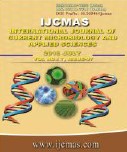


 National Academy of Agricultural Sciences (NAAS)
National Academy of Agricultural Sciences (NAAS)

|
PRINT ISSN : 2319-7692
Online ISSN : 2319-7706 Issues : 12 per year Publisher : Excellent Publishers Email : editorijcmas@gmail.com / submit@ijcmas.com Editor-in-chief: Dr.M.Prakash Index Copernicus ICV 2018: 95.39 NAAS RATING 2020: 5.38 |
Enzyme industrial wastes viz. multiple effect evaporator salts, primary sludge, filter press feed were evaluated for their phytotoxic effects under laboratory conditions to understand their potential to use as a nutrient medium for supporting plant growth. It was found that the industrial waste-water extract recorded lower contents of essential nutrients and the presence of heavy metals viz. Ni and Cd. Germination studies revealed the inhibitory effects of industrial waste-water extracts on percentage and rate of seed germination and length of plumule and radicle. None of the seeds germinated in MEES: water extract and seed germination of tomato as indexed by rate 6.11 in PS: water extract exhibited the inhibitory effect by primary sludge on seeds. The length of radicle (5.79) and plumule (4.94) was relatively lesser in PS: water extract to that of FPF: water extract and control. The incubation study carried out in the laboratory conditions to understand the rate of decomposition of urban solid waste alone and three different industrial waste-composts prepared by combining urban solid waste with enzyme industrial wastes viz. multiple effect evaporator salts, primary sludge, filter press feed revealed that the carbon-di-oxide evolved was higher in incubating urban solid waste-multiple effect evaporator salts exhibiting a higher rate of decomposition due to the presence of more easily degradable compounds. This was 6.10 mg CO2 100 gc-1 day-1 on the 50th day of incubation in urban solid waste-multiple effect evaporator salts and 2.60 mg CO2 100 gc-1 day-1 in incubating urban solid waste alone at the 50th day of incubation. The cumulative CO2 evolved ranged from 32.27 mg CO2 100 gc-1in urban solid waste alone to 89.48 mg CO2 100 gc-1 in urban solid waste+ multiple effect evaporator salts on the 50th day of incubation.
 |
 |
 |
 |
 |